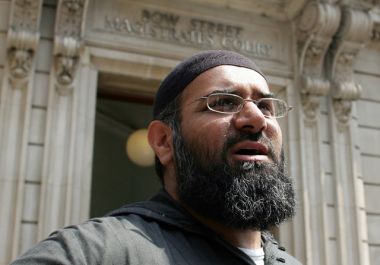Choudary could be held in isolated prison unit to prevent him radicalising fellow inmates
Fears over Anjem Choudary's ability to radicalise Muslim inmates in prison could lead to him being kept for years in an isolated unit.

Choudary, who was convicted last month of backing Islamic State and faces trial in September, has so far been held in Belmarsh top-security jail in south-east London, where a special unit enables the Prison Service to hold the most dangerous and disruptive inmates.
"The Prison Service will have to limit opportunities for radicalisation to take place but it can be done," David Wilson, a former prison governor who is now professor of criminology at Birmingham City university, told The Times.
"You have to limit their ability to engage with other inmates. Segregation and control would seem to be what you would want to do and that points to close-supervision centres".
Visits, letters and literature in cells can be vetted, and governors can prevent someone attending Friday prayers with other Muslim inmates, though imams would be allowed to visit him in his cell. The danger comes with communication through cell windows or when in communal areas on prison wings.
Currently, the authorities are allowed to hold up to 60 of the most disruptive prisoners in closed-supervision areas
An official review found last month that a small number of Islamist inmates in England and Wales are proselytising some of the country's 12,500 Muslim prisoners and should be isolated within top-security prisons.
Ian Acheson, a former prison governor who wrote the report, called for "incapacitation" units to tackle the Islamist prisoners and said that the National Offender Management Service, which runs prisons, lacked a coherent strategy. His report found complacency among prison guards over the threat.
"There are a small number of people whose behaviour is so egregious in relation to proselytising this ... lethal nihilistic death cult ideology — which gets magnified inside prison, particularly when you have a supply of impulsive and often highly violent young men — that they need to be incapacitated from being able to proselytise to the rest of the prison population", Acheson told the Commons justice committee of MPs last month.
The outgoing Justice Secretary Michael Gove said he was "extremely sympathetic" to the plan to isolate the Islamists, The Times reported.
Acheson said that some of the extremists were in prison for reasons other than terror-related offences but had become radicalised while in prison. "The problem is serious but not out of control. There are a number of prisons where the problem is particularly serious," he said.
Outlining his plans for purpose-built units within high security prisons, Acheson added: "It is not about prisons for Muslims or prisons for terrorists. It is a nuanced response that holds out the possibility of redemption."
Acheson said that the review team had visited prisons in the Netherlands, France and Spain, where they were beginning to separate their extremist prisoners.











